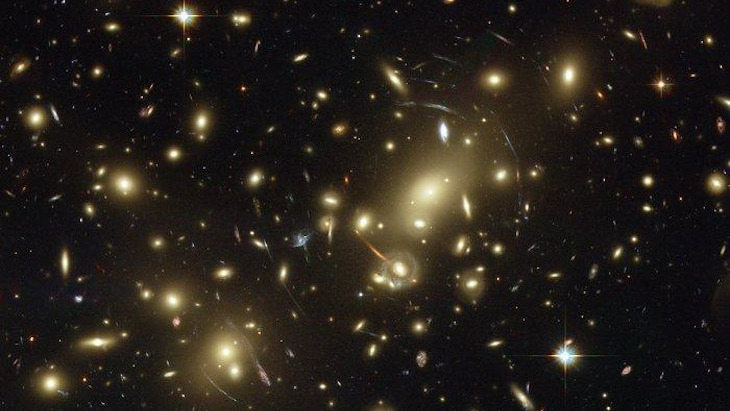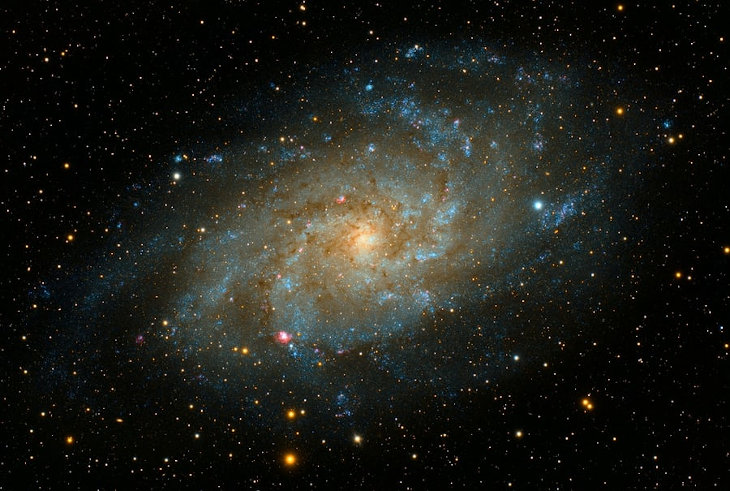 Raise a Glass to Freedom
Raise a Glass to Freedom


6 min read
The starry sky is beautiful but is it anything more than that? What other significance might knowledge of the heavens hold for us?
This stunning photo of the distant, older universe is impressive. Still, like all the other magnificent images of nature that we are accustomed to seeing on the web, on TV, or in papers, they raise a question for those seeking a deeper spiritual and ethical life: Who cares? Why is it important to be attentive to or knowledgeable about them? Is there anything of importance can they tell us that theology does not already teach?
Rabbi Meir ibn Gabbai, expelled from Spain when he was thirteen years old, became one of the leading Kabbalists of the 16th century. He devotes a lengthy portion of one of his major works of Kabbalah to a review of cosmology – the nature and origin of the universe. In it, he asks – and answers – this same question. He introduces this material by asking: why should anyone interested in spiritual growth bother with seemingly unconnected topics like “astronomy”?
He answers: “It is impossible to grasp the depth of [spiritual] matters if you have not first become familiar with astronomy ….”
The concepts in Kabbalah would just be poetic words without an understanding of what the cosmos really is and how it came to be. An understanding of the nature of the universe is more than just interesting – it forces us to confront more pressing human questions: Do I have free will? Is humanity alone in the cosmos? What is real? Is there a purpose? Readers who look to the Kabbalah for help answering such intimate and foundational questions should know that science in the 21st century offers relevant, startlingly new and often uncomfortable insights. We know much more about the cosmos than did Ibn Gabbai, and our powerful mathematical and scientific vocabulary enables us to make the cosmos and the Creation more intuitive, more sensible, and even more intimate.
Readers who look to the Kabbalah for help answering such intimate and foundational questions should know that science in the 21st century offers relevant, startlingly new and often uncomfortable insights.
Science has a theological dimension. For the first time in human history, we can reply to God’s challenge to the distraught Biblical figure Job, “Where were you when I secreted matter? Speak up if you understand the Creation!” The modern response: “We don’t understand everything, but today we actually do have a good grasp of many details, and as new experiments probe more deeply, our models are confirmed.” (Examples include how the quantum vacuum may have spontaneously produced the seed of the big bang, why atomic particles were produced during the first three minutes, and when the first atoms appeared.)
The expression “god of the gaps” is the derogatory term used to describe a deity invoked to “explain” anything that is not understood, the Creation, for example. But today, those gaps are getting smaller, and the God of the gaps is passé, if not foolish. A consequence is that spiritual belief today need not be based on ignorance, as with the challenge to Job, but rather on knowledge. As Galileo Galilei famously argued, God’s Book of Nature is as sacred as scriptural texts.
The expression “god of the gaps” is the derogatory term used to describe a deity invoked to “explain” anything that is not understood, the Creation, for example.
Some religious seekers grudgingly admit the successes of science but don’t take advantage of its insightful truths. Instead they cite science rhetorically for support – for the credibility science lends to the authority of the Kabbalah when concepts overlap. For example, that the universe had a beginning (“Let there be light!” = the big bang) rather than being eternal and static, the entity envisioned by most thinkers from antiquity until Einstein and Hubble. Unfortunately, this approach suffers greatly, like that of an apologist, by starting from a preconceived notion and using the undeniable success of science simply to bolster that notion: “You see, I am right. Science proves it.” But like any apologetic argument, while it might help convince another person, fixed preconceptions do not elevate a seeker to higher levels.
 Photo credit: Guillermo Ferla, Unsplash.com
Photo credit: Guillermo Ferla, Unsplash.com
That is Ibn Gabbai’s rejoinder! If you want a closer relationship to God and wisdom, to the World you live in, to other people, and to yourself, then you are advised to know more about them and their truth. Science offers a critical avenue, but can take effort. Any serious attempt to learn about the deep nature of the universe – how it arose, what it is, and how it behaves – is complex. The Psalmist puts it this way, “Your thoughts are very deep… a simple person [someone looking for simple explanations] won’t understand them.” Although the nature of the universe is much clearer to us today than it was to Ibn Gabbai, and wonderfully eye-opening at that, the answers to the questions asked by Kabbalists and cosmologists are intricate.
One example is exoplanets – planets around other stars. The recent discovery of thousands of them is exciting but not surprising. Exoplanets have been thought to be ubiquitous since the time of the Greeks. The Talmudic sages speculated about life around other stars based on passages in the Bible (Tanach) and imagine life to be common in the universe. But the modern surprise is that these exoplanets are highly varied, many of them unlike any planets in our solar system. The universe is vast and probably contains many Earth-like habitable exoplanets, but this same expansive vastness renders such hypothetical exoplanets inaccessible to humanity because the finite speed of light places them eons away.
In the volume of space around the Earth that light could traverse in one hundred human generations (a very long time!), there are only about thirty million stars, probably insufficient to beat the chances of forming and evolving intelligent life. Although this volume is only a tiny fraction of our galaxy, the time for light to travel to farther regions is even greater. The bizarre variety of exoplanet properties adds to the conclusion that it is very unlikely we will encounter (or even know about!) aliens in the foreseeable future. There are just not enough suitable nearby places available to overcome the unlikely combination of requirements for life forming, evolving to become intelligent, and then surviving long enough to prosper.
The first implication is that the Earth is not a dime-a-dozen place. Most likely, we will not even know if another civilization exists for millennia, if then. This realization should highlight the blessed nature of the Earth and its life, and our ethical responsibilities to “serve and guard” the Earth (Genesis). The second implication is that story of humanity told in Genesis is just a bare glimpse of the profound, complex and urgent relationships we have with the Divine Creation.
Featured image: Credit: NASA, ESA, and Johan Richard
